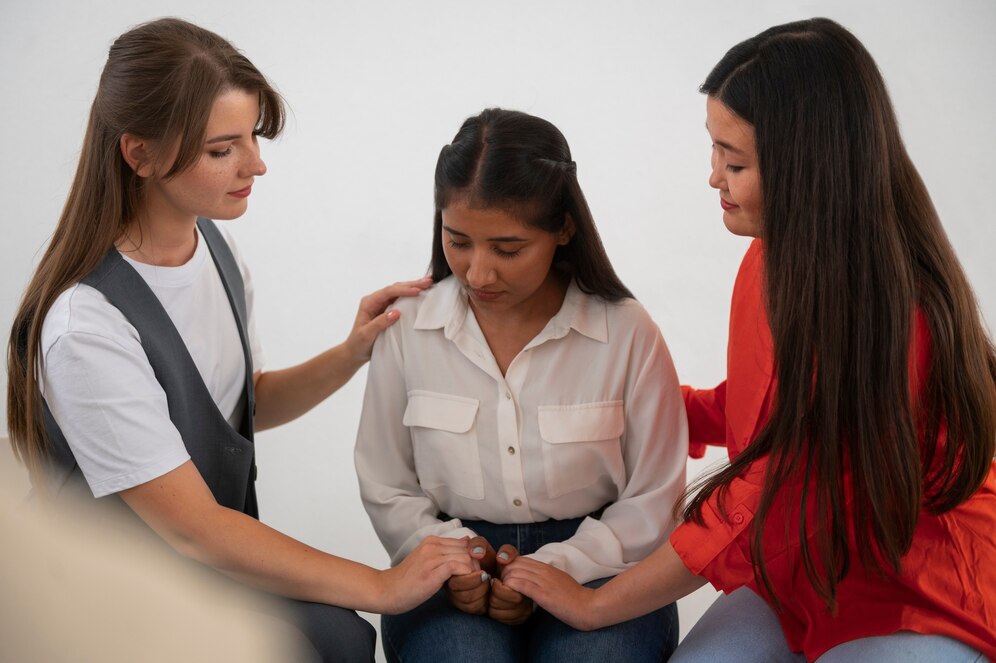
Addressing Peer Pressure and Puberty Changes
“Everyone Else Is Doing It!”
Puberty is a time of enormous change — not just for your child’s body and emotions, but also for their social world. As hormones start to surge and friendships grow more complex, peer influence becomes a central force in your tween’s or teen’s life. Suddenly, being accepted, fitting in, and avoiding embarrassment can feel more important than personal values or even safety.
Sound familiar?
Peer pressure isn’t always dramatic or dangerous. Sometimes it’s subtle trying a new style, copying a friend’s slang, laughing at a joke that isn’t funny (or kind). But during puberty, these social nudges can be powerful — and difficult to navigate.
As a parent, your role isn’t to shield your child from pressure. It’s to equip them with the tools to recognise it, resist it when needed, and build self-trust in the face of change. This blog post explores how puberty magnifies peer pressure, what healthy social development looks like, and how to help your child stay true to themselves, even when everyone else is doing something different.
Understanding Peer Pressure During Puberty

Why Peer Influence Peaks in Adolescence
As children move through puberty, they become increasingly aware of — and concerned about — what others think.
This is due in part to:
- Brain development: The adolescent brain is wired to prioritise social connection and acceptance. The reward system is more active, especially in social contexts.
- Identity formation: Puberty is when kids start figuring out who they are, and friends play a big part in shaping that.
- Increased independence: As kids pull away from parents and look toward peers, their friend group gains influence over choices and behaviours.
The need to belong becomes stronger than ever — and that’s not a flaw. It’s a developmental milestone.
What Does Peer Pressure Look Like?
Peer pressure doesn’t always come with an aggressive “Do it or else!” tone.
It’s often more nuanced:
- Being laughed at for dressing differently
- Watching everyone break a rule — and not wanting to be the only one who doesn’t
- Feeling pressured to talk or behave in ways that feel unnatural
- Being asked to keep a secret that feels uncomfortable
It can also be positive. Friends might encourage your child to:
- Join a new club
- Stand up for someone being bullied
- Study harder or try a new activity
Teaching kids to discern healthy vs. harmful pressure is key.
How Puberty Intensifies Peer Pressure
Physical and Emotional Changes
During puberty, your child may feel uncertain about:
- Their changing body
- Mood swings or emotions that they don’t fully understand
- Attraction or romantic interest
These vulnerabilities can make them more likely to compare themselves to others and adjust their behaviour to fit in.
A Desire to Belong
Social groups offer teens and tweens:
- A sense of identity (“I’m sporty,” “I’m popular,” “I’m quirky”)
- Protection from feeling “othered”
- Approval and status
Sometimes, the cost of admission is compliance — even if it goes against their values.
Teaching Social Skills to Navigate Peer Pressure
1. Help Them Define Their Values
Ask your child:
- “What kind of person do you want to be?”
- “What qualities do you admire in others?”
- “How do you want to treat people?”
Encourage them to write down or voice their personal “code.” When they know what matters to them, they’re more likely to act from integrity, not impulse.
2. Teach Assertiveness, Not Aggression
Assertiveness means expressing yourself clearly and respectfully, without giving in or lashing out.
Use roleplay to practise saying:
- “I’m not comfortable with that.”
- “I don’t want to get in trouble.”
- “You do you — but I’m good.”
Remind them that tone matters as much as words. Confidence doesn’t have to be loud — just steady.
3. Give Them Exit Strategies
Not all situations can be handled with words. Give your child practical ways to remove themselves from tricky moments.
- Code words: They can text you if they need a reason to leave
- Blaming parents: “My mum would kill me if I did that.”
- Suggesting alternatives: “Let’s do something else instead.”
Let them know it’s okay to walk away — and that leaving doesn’t make them weak. It makes them wise.
Supporting Emotional Resilience

Validate Their Feelings
Don’t dismiss fears of exclusion or embarrassment. Acknowledge how hard it is to go against the group.
Try saying:
“I know it’s tough to stand out — especially when everyone’s doing something different. I’m really proud of you for trusting yourself.”
Resisting peer pressure isn’t just a skill — it’s an act of courage.
Encourage Reflective Thinking
After social situations, ask:
- “How did that feel?”
- “Did you feel like you were true to yourself?”
- “Is there anything you’d do differently next time?”
Reflection turns experiences into learning. Avoid sounding like you’re quizzing or judging.
Teach Them to Trust Their Gut
One of the most powerful gifts you can offer is permission to trust instinct.
Say: “If something feels off—even if you can’t explain—it’s okay to say no or walk away.”
Instinct is often our first line of defence.
Puberty, Pressure, and Identity Exploration
Friend Groups and “Fitting In”
During puberty, friend groups can shift dramatically:
- Feel pushed to conform to a new group’s norms
- Be excluded for not going along with trends
- Struggle to keep up with social dynamics they don’t understand yet
Support them by helping them reflect on:
- Which friendships feel energising vs. draining
- Whether they feel accepted as they are
- Whether they like who they are when they’re with those friends
Romantic Pressure
Puberty often brings the first waves of:
- Crushes
- Relationship curiosity
- Discussions about physical affection or intimacy
Peer pressure in this context might include:
- Feeling like they need to date someone to fit in
- Pressure to engage in physical contact before they’re ready
- Talking or joking about others in uncomfortable ways
Teach them:
- It’s okay to be curious, and okay not to act on curiosity
- Respect and readiness matter more than rushing
- Real friends don’t push you past your boundaries
When to Step In: Red Flags to Watch For
Emotional or Behavioural Shifts
Keep an eye on:
- Sudden withdrawal from family or longtime friends
- New risky behaviours (vaping, lying, rule-breaking)
- Extreme mood swings or anxiety after social time
- Expressions of shame, confusion, or low self-worth
These could indicate negative peer influence or emotional overwhelm.
Bullying and Coercion
Some pressure is subtle. But if your child is being:
- Threatened
- Blackmailed
- Ridiculed or excluded in harmful ways
they need your support and intervention. Loop in teachers or school counsellors when needed. Document behaviour patterns. Offer consistent reassurance that they’re not at fault.
Empowering Kids to Be “Influencers” Themselves
Help Them Be Leaders
Kids who can say “no” confidently often become quiet leaders in their peer group.
Show your child how to:
- Support others who are being pressured
- Suggest alternatives during risky moments
- Encourage kindness and inclusion
Let them know:
“Standing up for yourself sometimes means standing up for others, too.”
Praise Effort, Not Just Outcome
Celebrate:
- Small acts of self-trust
- Moments of honesty
- Attempts to walk away from peer pressure — even if it wasn’t perfect
Say:
“That was a hard choice — and you handled it with courage.”
Conclusion: Raising Resilient Kids in a Noisy World

The journey through puberty is messy and magical. As your child’s body changes, so does their inner world — including how they see themselves and who they want to be around. Peer pressure will show up in whispers and waves, online and off. But with the right tools, your child can learn to navigate it with strength, kindness, and clarity.
Your job isn’t to shield them from all discomfort, but to walk beside them as they build the muscle of self-awareness.
Remind them often: They are allowed to say no. They are worthy without imitation. And they are never alone.
Want to take the next step? Try this question at dinner tonight: “What’s something you’ve done recently that felt true to you, even if others did something different?”
And if you have tips, stories, or questions, leave a comment below — your experience could help another parent guide their child through this crucial chapter.


